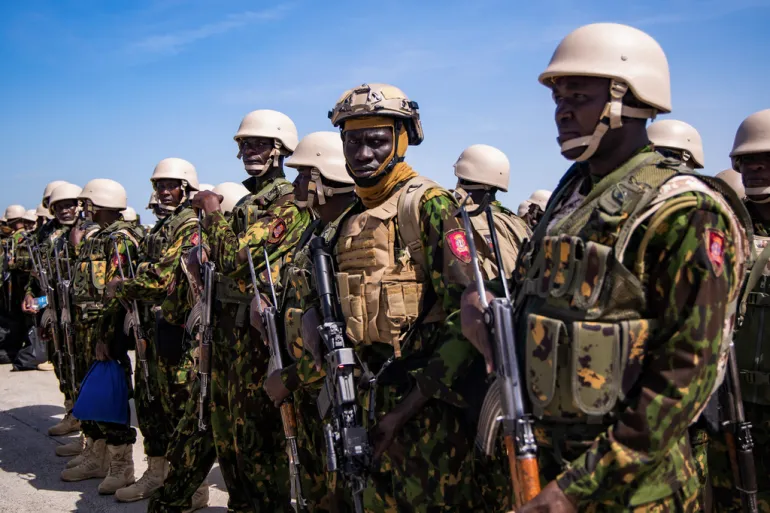
In a significant development responding to Haiti’s escalating gang violence, a United Nations-backed foreign police contingent arrived in the Caribbean nation on Tuesday. This marks the beginning of an international effort to combat the powerful armed gangs that have caused widespread turmoil and instability.
A group of Kenyan police officers was among the first to land at Toussaint Louverture International Airport near the capital, Port-au-Prince. The arrival of these officers comes after the airport had been temporarily closed due to gang-related violence. The Kenyan officers, dressed in camouflage uniforms and carrying rifles, were seen waving Kenyan flags as they stepped onto Haitian soil. This deployment is part of a larger force that will eventually include 2,500 officers from multiple countries, deployed in phases at a projected annual cost of $600 million.
![Police from Kenya arrive at the Toussaint Louverture international airport in Port-au-Prince, Haiti, on Tuesday, June 25, 2024 [Odelyn Joseph/AP Photo]](https://www.aljazeera.com/wp-content/uploads/2024/06/AP24177511718604-1719354534.jpg?w=770&resize=770%2C514&quality=80)
The initiative has received international support, including a significant contribution from the United States. President Joe Biden expressed gratitude to all the countries that have pledged personnel and financial resources to the mission. "I commend — and am deeply grateful to — all the countries that have pledged personnel and financial support to this mission," Biden said in a statement. The U.S. has committed $360 million to support the effort.
While the UN has been urging the global community to send a security force to Haiti, the initiative has faced skepticism due to Haiti’s long and controversial history of foreign interventions. Critics have raised concerns about the lack of clear objectives and strategies for the mission. Romain Le Cour Grandmaison, a senior expert at the Global Initiative Against Transnational Organized Crime, emphasized the need for transparency. "What is going to happen vis-a-vis the gangs? Is it a static mission? Is it a moving mission? All those details are still missing, and I think it’s about time that there’s actually transparency," he said.
Despite these concerns, Haitian Prime Minister Garry Conille praised the effort, expressing hope that the mission would help stabilize the country. "The country is going through very difficult times. We’re going to start working little by little to retake the country," Conille said. He was joined by Monica Juma, a security adviser to Kenyan President William Ruto, who stated that the forces would act as "agents of peace, of stability, of hope."
The mission's launch coincided with troubling news from Kenya, where police in Nairobi opened fire on protesters attempting to storm the parliament, resulting in several deaths and injuries. This incident has raised doubts about the Kenyan police’s ability to manage the situation in Haiti. Enock Alumasi Makanga, a former Kenyan police officer now working in private security, voiced his concerns: "The police should be able to operate well in their own country, but they can’t. How do you think they can manage then when they arrive in Haiti?"
Addressing these concerns, U.S. State Department spokesperson Matthew Miller assured that the Kenyan personnel in Haiti had been vetted and emphasized the importance of upholding human rights.
The situation in Haiti remains dire, with over 80% of Port-au-Prince under gang control. The arrival of the UN-backed police contingent represents a critical step towards addressing the rampant violence and restoring order. However, the mission's success will depend on its execution and the international community's continued support and oversight.











